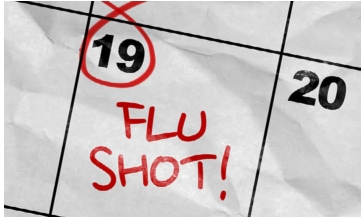HIT ME WITH YOUR BEST SHOT

Benefits of the flu vaccine
The time of year is fast approaching where on every pharmacy corner there is a public service announcement encouraging everyone to receive their annual flu vaccination.
There are some business and working environments that require their employees to vaccinate, and almost every healthcare professional will offer the common knowledge that the most important groups to receive the shot are the young, old and at-risk. However, because the flu and the flu vaccination are such an often-discussed subject of health conversations, some may overlook the benefits of the flu shot.
The most obvious reason and benefit of receiving an annual flu vaccine is to lower the risk and prevent against contracting the flu. A secondary benefit in this situation is to limit the exposure to those you live with, particularly if they are in ill health.
“Everyone should get a flu shot to protect themselves and loved ones from the flu, said Angela Miller, nurse practitioner at CHRISTUS Primary Care-South Bossier. “If you are healthy but live with someone who is not, you can bring the flu to them, and they may become seriously ill. Taking the shot helps to reduce the spread of flu as well.”
While the symptoms of the flu are enough for someone to get vaccinated, the real danger can be in the complications from the illness, and most significantly for those not in optimal health.
“[The shot] benefits all ages in reduction of illness,” Miller said. “The young and elderly are at risk of developing complications from the flu. Each year there are deaths from all age groups due to flu, [and] the shot can reduce the seriousness of disease and prevent death.”
According to the CDC, the vaccination is also necessary for those with chronic health conditions, as it lowers the risk of cardiac events in those with heart disease, as well as other potential hospitalizations for those with diabetes and lung disease.
The vaccine is created annually based upon the science and research done in tracking the flu. The CDC explains that each annual shot is given to ward against which strain of the flu should be most common that year. In determining how effective it will be, they state the factors including the characteristics of the person being vaccinated such as age and health status and the similarities between the vaccine and the actual virus.
“The flu shot is blended each year based on the expected trend of flu virus,” Miller said. “While flu is not 100 percent preventable, the shot does reduce the course and severity of the disease.”
“The flu shot will reduce severity of disease as well as length of disease,” Miller continued. “This can help to prevent missed school and work days. In addition those who are vaccinated help reduce the spread of the disease. If you are healthy but a loved one is not, you would not want them to get the flu. They have a weaker immune system for fighting off the flu and are likely to develop complications such as dehydration, infection, pneumonia. Each year people are hospitalized, and some die as a result of getting the flu. Anyone who has a weakened immune system is at higher risk. This include anyone who has a chronic illness, such as asthma, COPD, diabetes, seizure disorder, any heart illness or complication, high blood pressure or stroke.”
While it is reasonable for a woman who is expecting to receive the flu shot, the specifics of when should be left up to her tending physician.
“Pregnant women are at risk of complications from the flu,” Miller said. “Their OB doctor will give them the flu injection at the appropriate time. They should always consult their OB provider before being vaccinated.”
The CDC states the flu vaccine helps to protect women during their pregnancy and their babies for up to six months after they are born. Additionally, their studies have shown the vaccination in pregnant women was 92 percent effective in preventing hospitalization of infants for the flu.
Side effects are often discussed as a part of the vaccination conversation. Miller said the potential side effects of injection include pain at injection site and a low-grade temp for up to 24 hours. Because the injection is not a live virus, it does not cause the flu. The CDC explains that they are mild and short-lasting, especially when compared to the symptoms of having the flu.
